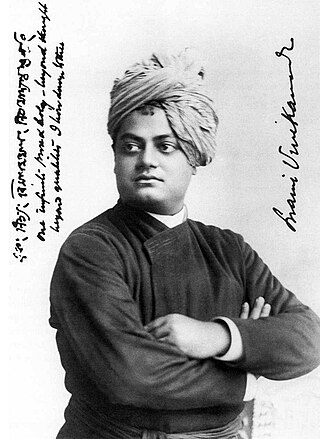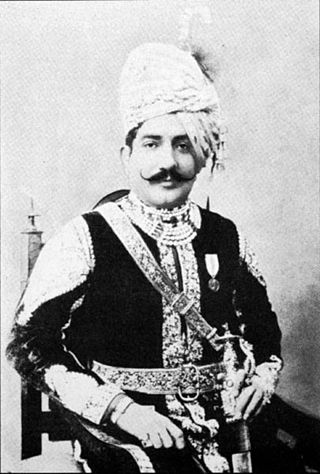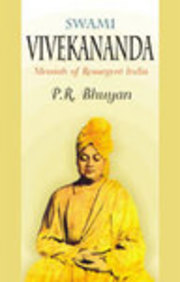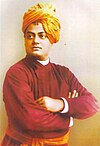
Swami Vivekananda, born Narendranath Datta, was an Indian Hindu monk, philosopher, author, religious teacher, and the chief disciple of the Indian mystic Ramakrishna. He was a key figure in the introduction of Vedanta and Yoga to the Western world, and the father of modern Indian nationalism who is credited with raising interfaith awareness and bringing Hinduism to the status of a major world religion.

Shuddhananda who was the fifth president of the Ramakrishna Order, was a direct monastic disciple of Vivekananda. He joined the Ramakrishna Math in 1897. He became a trustee of Ramakrishna Math and a member of the governing body of Ramakrishna Mission in May 1903. He also took up the editorship of the Bengali magazine called Udbodhan for sometime. He was appointed as the secretary of the math and the mission in 1927 and as the vice president in 1937. In 1938, he became the president of the order. His tenure was short, as he died in 1938. He is renowned in the literary circles to have translated most of Vivekananda's original works from English to Bengali.

Sister Nivedita was an Irish teacher, author, social activist, school founder and disciple of Swami Vivekananda. She spent her childhood and early youth in Ireland. She was engaged to marry a Welsh youth, but he died soon after their engagement.
Swamiji is a 2012 laser show and documentary film directed and produced by Manick Sorcar. Based on the life story of Hindu monk Swami Vivekananda (1863–1902), it is the first laser documentary made on an individual and the first full-length laser documentary ever to be shown in a performing arts center.

Narayan Debnath was an Indian comics artist, writer and illustrator. He created the Bengali comic strips Handa Bhonda (1962), Bantul the Great (1965) and Nonte Phonte (1969). He holds the record of longest running comics by an individual artiste for Handa Bhonda comics series which completed its continuous 53 years of running. He was the first and only comics artist in India who has received a D. Litt. degree. Debnath was awarded Padma Shri, the fourth highest civilian award in India, in the year 2021.

Vedanta Societies refer to organizations, groups, or societies formed for the study, practice, and propagation of Vedanta, the culmination of Vedas. More specifically, they "comprise the American arm of the Indian Ramakrishna movement" and refer to branches of the Ramakrishna Order located outside India.

Sister Gargi, born Marie Louise Burke, was a writer and an eminent researcher on Swami Vivekananda, and a leading literary figure of the Ramakrishna-Vivekananda movement. Gargi was introduced to the Ramakrishna-Vivekananda movement in 1948 by Swami Ashokananda. She is known for her six-volume work, Swami Vivekananda in the West: New Discoveries. Her New Discoveries are considered as indispensable for Swami Vivekananda research.

Raja Ajit Singh Bahadur was the ruler of the Shekhawat estate (thikana) of Khetri at Panchpana in Rajasthan between 1870 and 1901. He was born on 16 October 1861 at Alsisar. His father was Thakur Chattu Singh, a resident of Alsisar. Ajit Singh was later adopted to Khetri and after the death of Fateh Singh, he became the eighth king of Khetri in 1870. In 1876, he married Rani Champawatiji Sahiba and the couple had one son and two daughters. He died on 18 January 1901 due to an accident at the tomb of Akbar in Sikandra near Agra and was cremated at Mathura.

Eknath Ramakrishna Ranade was a social activist and right-wing leader. He joined the Rashtriya Swayamsevak Sangh (RSS) when in school and was its general secretary from 1956 to 1962.

Swami Vivekananda in the West: New Discoveries is a series of biographical books on Swami Vivekananda written by Marie Louise Burke, who is popularly known as Sister Gargi. There are six volumes in the series. This series of books was first published in two volumes in 1957. In 1983–87, these series was republished in six volumes. The book is high acclaimed not just in India, but also in the Vedanta circles around the world.

Swami Vivekananda (1863–1902) was an Indian Hindu monk and a key figure in the introduction of Indian philosophies of Vedanta and Yoga to the western world. He was one of the most influential philosophers and social reformers in his contemporary India and the most successful and influential missionaries of Vedanta to the Western world. Indian Nobel laureate poet Rabindranath Tagore's suggested to study the works of Vivekananda to understand India. He also told, in Vivekananda there was nothing negative, but everything positive.

Swami Vivekananda: Messiah of Resurgent India (2003) is a book written by Pranaba Ranjan Bhuyan. This book is a comprehensive biography of Swami Vivekananda. The book was published by Atlantic Publishers & Dist, New Delhi.

Biley or Bilay is a 2012 Bengali drama created by Bengali theatre group Lokkrishti, This is a dramatisation of the life and works of Swami Vivekananda. Debshankar Haldar played the lead role. Phalguni Chattopadhyay directed this drama and Ujjwal Chattopadhyay was the playwright.

Bireswar (2013) is an experimental drama produced by Belgharia Shankhamala theatre group. The eventful life of Swami Vivekananda has been depicted in this drama.

The Swami Vivekananda statue is a bronze statue of the Hindu Indian monk Swami Vivekananda (1863–1902), located in Golpark neighbourhood in the Indian city of Kolkata. The original statue, made of marble and unveiled in 1966, was the oldest statue of Swami Vivekananda in the city. The old statue was replaced by a new, taller one in 2005.

Bartaman Bharat is a Bengali language essay written by Indian Hindu monk Swami Vivekananda. The essay was first published in the March 1899 issue of Udbodhan, the only Bengali language magazine of Ramakrishna Math and Ramakrishna Mission. The essay was published as a book in 1905, and later it was compiled into the fourth volume of The Complete Works of Swami Vivekananda.

Swami Vivekananda, the nineteenth-century Indian Hindu monk, is considered one of the most influential people of modern India and Hinduism. Rabindranath Tagore suggested to study Vivekananda's works to learn about India. Indian independence activist Subhas Chandra Bose regarded Vivekananda as his spiritual teacher. Mahatma Gandhi said that after reading the works of Vivekananda, his love for his nation became a thousand-fold.

Sangeet Kalpataru is a Bengali language song anthology edited and compiled by Swami Vivekananda and Vaishnav Charan Basak. The book was first published in August or September 1887 from Arya Pustakalaya, Calcutta. In 2000, the book was reprinted by the Ramakrishna Mission Institute of Culture. It was edited with a critical introduction by Dr. Sarbananda Choudhury.

The Monk as Man: The Unknown Life of Swami Vivekananda or Achena Ajana Vivekananda is a book about Swami Vivekananda written by Shankar. In this book, Shankar discussed many unknown events of Vivekananda's life.

A Bouquet of Swami Vivekananda's Writings is a book created by compiling original handwritten works of Swami Vivekananda.



















